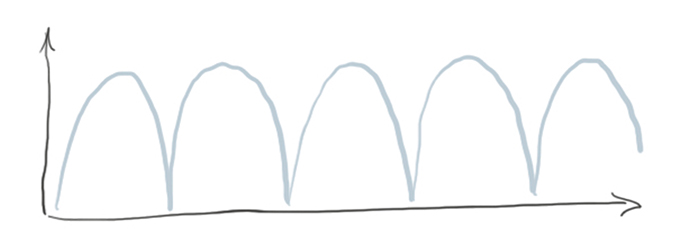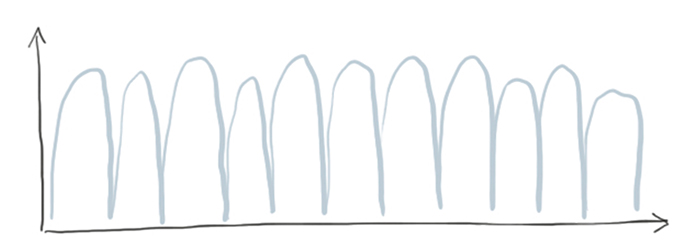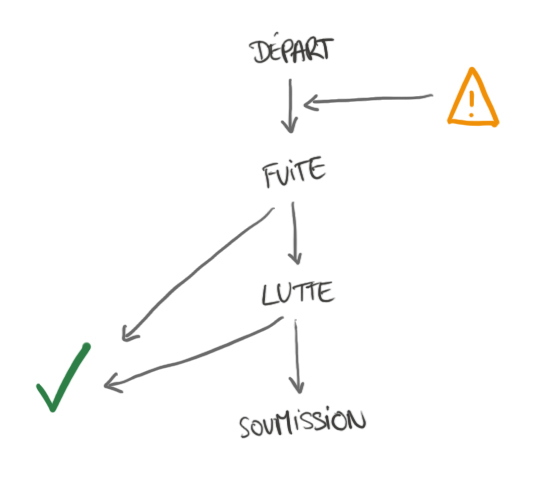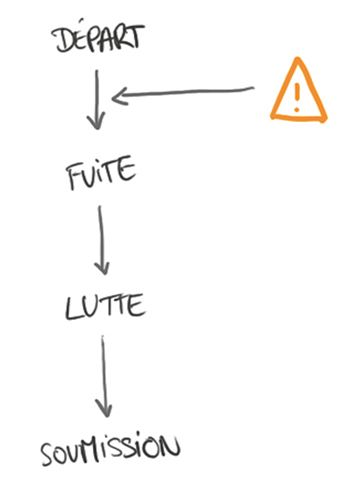Aujourd’hui on va parler du stress chez les hypersensibles. Comment il fonctionne ? Comment s’en débarrasser ? Si vous êtes hypersensible ça vous aidera à vivre heureux avec votre hypersensibilité. Sans les techniques dont je vais parler dans cet article, vous risquez de vous épuiser moralement et physiquement (et même de finir en burnout ou en dépression !). Les personnes hypersensibles en souffrent en effet plus souvent malheureusement à cause de leur grand stress.
Je suis Paul de Connect The Dots et mon hypersensibilité a été détectée il y a plus de dix ans maintenant. Et aujourd’hui je partage ce que j’ai appris pour aider les petits nouveaux.
NB : cet article est la transcription de la vidéo ci-dessus
Le stress chez les hypersensibles
Alors comment gérer son stress quand on est une personne hypersensible ? C’est une grande question et surtout vous n’êtes pas les seuls à vous la poser. Moi aussi je suis passé par là il y a quelque temps. J’étais quelqu’un d’hyper stressé. Je le suis toujours un peu, on ne va pas se mentir, mais j’arrive à gérer ce stress pour qu’il devienne beaucoup moins handicapant. Et ça c’est très pratique.
Pourquoi est-ce que beaucoup d’hypersensibles sont stressés, et même beaucoup de personnes pas hypersensibles sont stressées ? C’est parce qu’en fait on ne nous explique jamais à l’école comment fonctionne le stress. On nous le présente juste parce qu’on est stressés des examens. Mais on ne nous dit pas comment travailler dessus. Aujourd’hui vous avez de la chance parce que je vais vous expliquer. Je vais vous donner la méthode pour comprendre comment fonctionne le stress. C’est vraiment quatre étapes très simples à comprendre, vous allez voir.

Le problème du stress chez les hypersensibles
Mais d’abord, pourquoi est-ce que le stress est particulièrement problématique chez les personnes hypersensibles ? En fait on stresse beaucoup trop.
Le stress chez les neurotypiques

Là par exemple la courbe que je vous ai représentée représente le nombre de pics de stress qu’il y a pour une personne normale (qu’on appelle une personne neurotypique) au cours d’une journée. On voit en bas tout va bien. D’un coup il y a un moment stressant. Bim, ça monte. Et ensuite le stress redescend, puis ça remonte, ça redescend, et on alterne comme ça plusieurs pics tout au long de la journée.
Hypersensibilité et stress
Chez les personnes hypersensibles, il y a beaucoup plus de ces pics de stress parce que comme on est hypersensibles au monde on capte plus d’informations.

Et il y en a logiquement plus qui vont nous stresser et qui vont stimuler notre système nerveux. Résultat : on a beaucoup plus de pics de stress tout au long de la journée. Et au bout d’un moment ça use.
Ça use parce que ça tire sur notre système nerveux. Ça tire sur notre corps et ça l’épuise. Et en plus de tout ça, notre cerveau va produire plus de cortisol tout au long de la journée. Le stress demande de l’énergie à notre corps pour y faire face. Et le cortisol est une hormone d’énergie pure. Donc le cerveau en produit pour nous donner l’énergie de faire face à ce stress. Sauf que le cortisol normalement on doit avoir un pic le matin pour nous réveiller, et après son taux descend toute la journée pour qu’on puisse s’endormir le soir. Comme les hypersensibles ont plus de stress toute la journée, ils ont plus souvent des petits shoots de cortisol et le soir ils s’endorment beaucoup moins bien parce que leur taux n’est pas vraiment redescendu. C’est pour ça d’ailleurs que les hypersensibles dorment mal. Aussi, ils pensent trop et à tous avant de dormir. On a des nuits qui sont moins reposantes et le lendemain c’est un terrain encore plus propice pour du nouveau stress.
Le fonctionnement du stress
Mais d’où vient ce problème ? Comment fonctionne le stress ? C’est ce qu’on va voir dès maintenant.
D’où vient le stress ?
Déjà le stress c’est quelque chose de naturel. Il est là pour nous aider en cas de problème, en cas d’agression, pour nous donner de l’énergie dans le corps. C’est ce qu’on vient de voir. Comment ça se passe ? C’est lié à tout un système d’hormones. J’en parle plus en détails dans la mini formation sur l’hypersensibilité. Vous pouvez vous inscrire. C’est totalement gratuit. Ce serait un peu long et assez complexe pour que j’en parle dans cet article. Donc si ça vous intéresse allez-y.
Quand on est des hommes des cavernes, ce stress était utilisé lorsqu’il y avait un danger, quand on se trouve derrière un buisson et hop : un tigre à dents de sabre ! Qu’est-ce qu’on fait ? Là il y a le stress. Sauf qu’aujourd’hui on n’est plus des hommes de Cro-Magnon et on risque peu de se retrouver devant un tigre à dents de sabre (ou autre) dans notre vie de tous les jours. Ça arrive très rarement pour ne pas dire jamais. Notre mode de vie a évolué mais pas notre cerveau. La production de stress est toujours là. Et notre corps garde petit à petit tout ce stress qui n’est pas utilisé, toute cette énergie qui n’est pas utilisée.
Le processus d’anxiété dans le corps
Donc j’en reviens à mon histoire : comment ça marche ?

On commence avec une situation de départ, un élément, une situation normale où tout va bien. On n’est pas stressé.
Ensuite il y a un déclencheur, un élément perturbateur. Ça peut être le tigre à dents de sabre qui arrive. Qu’est-ce qu’il se passe ? Le stress nous donne de l’énergie dans les jambes. C’est pour ça que quand on est stressé on peut avoir les jambes qui tremblent un peu. En fait l’énergie va d’abord dans les jambes parce que le but premier était de fuir. On fuit devant le tigre à dents de sabre, sinon il va nous bouffer.
Suite à cette fuite, il y a deux solutions, deux choses qui peuvent se passer. La première, c’est que la fuite a fonctionné. On a réussi à partir plus vite que le tigre. Résultat : on se calme, ça va mieux. Sinon : pas de suite, la bête est toujours là, elle continue à nous pour chasser.
Là on passe dans la phase de lutte. C’est pour ça qu’après que les jambes se soient mises à trembler on peut avoir les muscles qui se contractent : la tête devient rouge, on s’énerve un peu. C’est parce qu’en fait le sang monte au niveau des muscles. La mâchoire se serre. On passe en mode combat, en mode fight. Suite à cette lutte, encore deux solutions. La première : on a réussi à battre le tigre, le stress se calme, ça va mieux. Sinon, on se soumet.
C’est la phase de soumission. On se soumet à l’animal. Il est plus fort que nous. Alors dans le cadre du tigre à dents de sabre c’est généralement qu’il va nous manger… mais sinon de manière générale on appelle ça la phase de soumission, c’est à dire que c’est l’autre qui a gagné.
Et qu’est-ce qu’il se passe ? Maintenant, on vit toujours ce stress physiologique au niveau de notre corps, mais il est devenu psychologique. Je m’explique.
Le stress de nos jours
On refait le processus mais de nos jours.
Imaginons la situation de départ. Vous êtes au boulot. Tout va bien. Vous faites votre travail. Journée tranquille.
Élément perturbateur : votre patron vient vous gueuler dessus. Voilà la source de stress !
Vous passez donc dans l’étape de fuite. Vous pourriez fuir et que ça aille mieux, mais a priori face à votre patron vous ne pouvez pas partir en courant. Ça ne se passe pas comme ça au boulot. Résultat vous êtes obligés d’aller dans la phase de lutte.
Vous arrivez dans la lutte, encore nos deux solutions. Vous êtes énervé mais vous ne pouvez pas vraiment lutter et vous énerver contre votre patron. Ça ne marche pas. Alors qu’est-ce que vous faites ? Vous vous énervez tout seul dans votre tête, vous gardez ça pour vous et vous passez à l’étape suivante qui est la soumission.
Et là vous vous soumettez face au boss. C’est « oui patron tu as raison ». Sauf que petit à petit, vous avez remarqué que ce stress n’est pas du tout évacué. C’est à dire que cette envie de fuir, cette lutte, cette énergie qu’on a en nous n’est pas évacuée vu qu’elle vient finir dans la soumission. Et petit à petit en fait, en répétant ces situations, on va emmagasiner plein de stress.

C’est cette surdose de stress qui n’est pas évacué qui fait que petit à petit on peut terminer en burn-out voire même en dépression. Et ce processus, ce cycle, est encore plus développé chez les personnes hypersensibles parce que, vous vous en doutez, l’engueulade par le patron va être vécue encore plus intensément. Résultat : on aura envie que soit encore plus grande, la lutte encore plus grande, et le stress emmagasiné par tout ça (ce circuit du stress) est encore plus grand.
Se libérer du stress quand on est hypersensible
Alors comment on peut essayer de casser ce cycle ?
Une solution qui est évoquée régulièrement c’est de remarquer qu’on n’est pas obligé de prendre la fuite ou de se battre et de lutter face à certaines situations. C’est à dire essayer de casser le truc. Si je n’ai pas besoin de prendre la fuite, je ne vais pas à l’étape suivante et ça va mieux.
Sinon une deuxième chose qui permet de casser un peu tout ça c’est d’arriver à relativiser sur l’élément déclencheur. Ici, relativiser sur le patron qui nous gueule dessus. Arriver à se dire que ce n’est pas forcément si grave. Il ne va pas nous virer pour ça. Essayez de diminuer un peu la charge émotionnelle de l’événement déclencheur pour que petit à petit le cycle du stress se mette moins en route, ou alors que le stress soit beaucoup moins fort. Si le patron n’était pas venu nous gueuler dessus ou si le patron vient gueuler mais qu’on s’en fiche royalement, ça ne va pas nous stresser plus que ça. Alors après je ne dis pas qu’il ne faut pas stresser quand le patron crie, mais il y a certaines situations où, peut-être, on intensifie trop intérieurement le stress et qu’il pourrait être vécu de manière plus légère.
Pour continuer à apprendre à gérer votre hypersensibilité au quotidien, sachez que j’organise un défi gratuit trois jours pour se connecter à son hypersensibilité c’est une mini formation rapide et gratuite dans laquelle vous allez apprendre à différencier vos émotions de celle des autres et à gérer et évacuer efficacement vos émotions. Vous pouvez vous inscrire en remplissant le formulaire juste au dessus !
